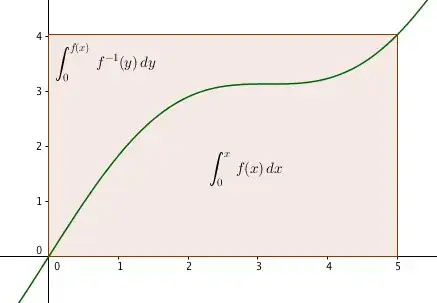Suppose that the function $f:[0,\infty)\rightarrow\mathbb{R}$ is continuous and strictly increasing and that $f:(0,\infty)\rightarrow\mathbb{R}$ is differentiable. Moreover, assume $f(0)=0$. Consider the formula $$\int_{0}^{x}f+\int_{0}^{f(x)}f^{-1}=xf(x)\qquad\text{for all $x\geq0$}$$ Prove this formula.
Attempt: Consider that $g(x)=\int_{0}^{x}f+\int_{0}^{f(x)}f^{-1}-xf(x)$ which is continuous on $\mathbb{R}$. Then differentiate $g(x)$, we have $g'(x)=f(x)+xf'(x)-f(x)-xf'(x)=0$. Thus for all $x$, $$g(x)-g(0)=0\Longrightarrow\int_{0}^{x}f+\int_{0}^{f(x)}f^{-1}-xf(x)=0$$
I am not sure my the equality valid not or not. If not, can someone give me a suggestion to modify the proof. Thanks.
